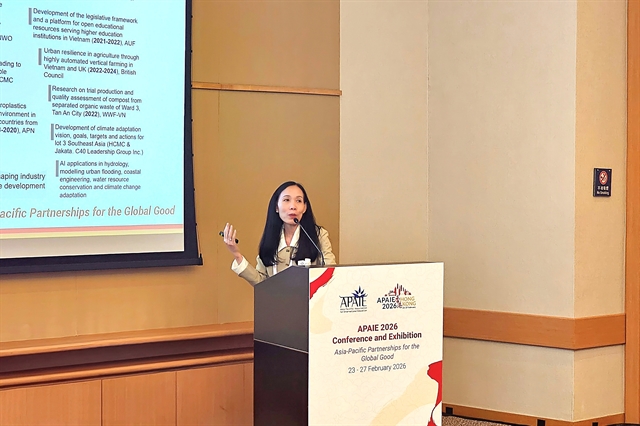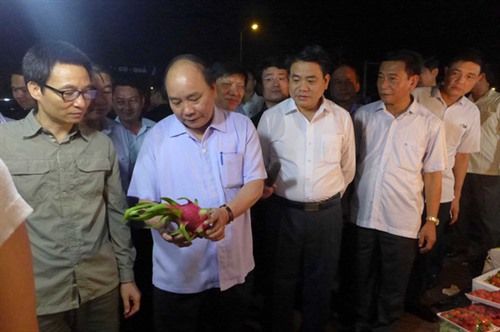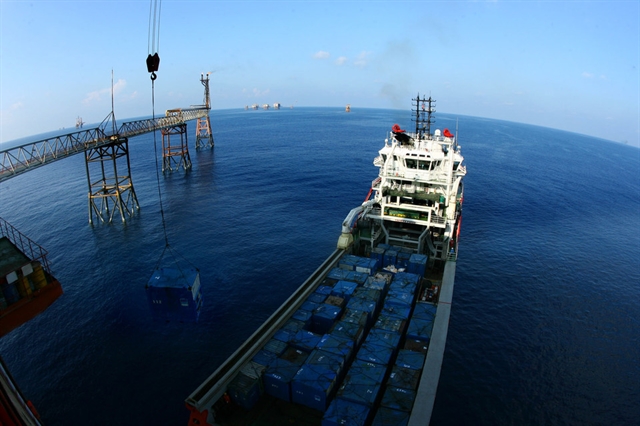 Society
Society

Small businesses should not sell low-quality food products that come from unclear sources, Prime Minister Nguyễn Xuân Phúc said to fruit vendors in the capital’s Hoàn Kiếm District while paying an unexpected visit to the Long Biên wholesale vegetable market to inspect food safety, yesterday morning.
 |
| Prime Minister Nguyễn Xuân Phúc (Second from Left) visits to the Long Biên wholesale vegetable market to inspect food safety, yesterday morning. — Photo nld.com.vn |
HÀ NỘI — Small businesses should not sell low-quality food products that come from unclear sources, Prime Minister Nguyễn Xuân Phúc said to fruit vendors in the capital’s Hoàn Kiếm District while paying an unexpected visit to the Long Biên wholesale vegetable market to inspect food safety, yesterday morning.
The PM was accompanied by Deputy PM Vũ Đức Đam and leaders of the prime minister’s office, ministries and the People’s Committee of the city.
Visiting several fruit kiosks at the market, the PM said small businesses should avoid fruits and vegetables that are infused with pesticides and unsafe growth stimulants, and those that were imported from unclear sources.
“The consumers’ health is of the utmost importance,” he said.
“Our future lies with the community’s health and wellbeing,” the PM said. “Each and every one of us should be aware about maintaining food safety to protect our health.”
The PM paid great attention to locally grown fruits, such as dragon fruit, ambarella and persimmon. He advised vendor owners to seek safe products with clear origins, especially those grown in the country.
The PM also visited Văn Đức Commune – an area popular for growing safe vegetables in Gia Lâm District – and talked to local farmers.
In response to the PM’s inquiries, Đặng Văn Tới, a commune farmer, said all members of the Văn Đức Clean Vegetable Cooperative were determined to stand against unqualified fertilizers and pesticides.
“We only buy fertilisers and microbiological plant protection products from the agency that has been certified by the food protection branch,” he said. “We eat the same vegetables that we grow and sell.”
The PM complimented the commitment of local farmers to growing clean vegetables. He also requested the district’s authorities, agricultural department and food protection branch to continue supporting farmers and supervising agencies that sell plant protection products.
He asked local authorities to support farmers in selling safe food products by creating consumption chains and reducing intermediary stages, so that products would be more affordable and able to maintain a competitive edge.
After the visits, the PM held a work meeting on food safety issues with the city People’s Committee.
At the meeting, the PM accepted the city’s proposal to form a quick response force to handle food safety problems.
City officials reported that a steering board for food safety has been set up, led by the chairman of the municipal People’s Committee, and similar steering boards had been established at all 30 districts and townships. The heads of local administrations must take responsibility for the field while vice chairpersons of district-level people’s committees are required to examine the food safety situation every two weeks. Chairpeople of communal-level people’s committees must make at least one inspection tour every week.
From January to September, Hà Nội inspected nearly 77,400 food-processing facilities and discovered 12,370 violations of relevant regulations. More than VNĐ22.6 billion (over US$1 million) in fines have been collected.
According to Chairman of the Hà Nội People’s Committee Nguyễn Đức Chung, the municipal administration would receive five specialised cars as gifts from Vingroup for quick food testing at markets at the end of the year.
At the meeting, PM Phúc told local authorities to press ahead with assigning specific duties and responsibilities to each official and agency, tighten the control of small abattoirs, and take drastic actions to improve the management of street food.
They must also strictly deal with violators, publicise information about unqualified food providers, launch food safety checking campaigns, and pay more heed to food safety at craft villages, the Government leader noted. — VNS




